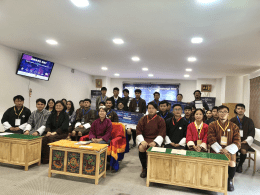In a significant step toward transforming its rural economy and safeguarding traditional knowledge, Bhutan officially launched its national Geographical Indication (GI) system on June 10. The initiative, heralded as a turning point for the country’s agri-food sector, seeks to blend innovation with heritage by promoting origin-linked products rooted in Bhutan’s culture, environment, and biodiversity.
The GI system is a collaborative effort between the Ministry of Industry, Commerce, and Employment and the Ministry of Agriculture and Livestock. Its launch aims to enhance agricultural productivity, stem the rise of fallow land, and help rural producers tap into high-value domestic and international markets.
Geographical Indication is a form of intellectual property protection that certifies products as originating from a specific place, where their quality or characteristics are intrinsically tied to geography and tradition. Bhutan’s GI system will protect and promote such products, enabling them to command premium prices while preserving rural identity.
Championing Local Products
The programme debuts with four pilot GI products: fermented yak cheese from Merak and Sakteng, honey and Yathra textiles from Bumthang, and buckwheat from Dhur and Tandigang. These items represent a fusion of cultural authenticity and ecological uniqueness, aligning with Bhutan’s long-term vision to register 205 such GI products nationwide.
To support this, the government, in partnership with the Food and Agriculture Organization (FAO) of the United Nations and the European Union (EU), has introduced GI regulations, designed a national logo, and developed control systems and manuals. Producer cooperatives have also been established to help streamline certification and market access.
“GI is more than just legal protection,” said Ken Shimizu, FAO Representative for Bhutan and Nepal. “It’s a powerful rural development tool—building consumer trust, raising farmer incomes, and safeguarding cultural heritage.”
Addressing Challenges in Rural Finance
Despite this progress, systemic challenges remain. Many farmers and agri-entrepreneurs, particularly in remote areas, still face limited access to affordable and customized financial services. With weak credit histories and limited collateral, rural producers struggle to invest in climate-resilient technologies, value-added enterprises, or market expansion.
These financial gaps are compounded by increasing threats from climate change—floods, droughts, pest outbreaks, and wildlife depredation—which continue to destabilize agricultural output and accelerate rural-to-urban migration.
To confront these issues, FAO organized a high-level seminar during the GI launch, focusing on “Rural Financing and De-risking Mechanisms for the Agri-Food Sector in Bhutan and Nepal.” The event brought together government agencies, financial institutions, producer groups, and development partners to foster dialogue on investment, branding, and value chain development.
A Regional Model in the Making
Bhutan’s GI system is closely aligned with FAO’s One Country One Priority Product (OCOP) initiative, a global programme aimed at transforming agri-food systems through the promotion of Special Agricultural Products (SAPs). Bhutan was the first country in the Asia-Pacific region to join OCOP in 2021, followed by Nepal. Today, over 94 countries are part of the initiative.
Under OCOP, Bhutan has strengthened the production and processing of culturally significant crops, including incorporating quinoa into hospital diets and exploring its role in school meals. These efforts are supported by broader initiatives like the Global Environment Facility (GEF) Food Systems Project.
“Bhutan’s GI journey reflects a blend of tradition, innovation, and sustainability,” said Dr. Jun He, FAO Senior Policy Officer. “It offers a replicable model for countries aiming to balance economic development with cultural preservation and environmental resilience.”
Towards Sustainable Prosperity
The government has also launched several initiatives to support farmers’ access to finance and de-risk agricultural activities. These include a Credit Guarantee System, low-interest loans under the Economic Stimulus Plan, a national crop and livestock insurance scheme, and a buy-back mechanism to ensure market stability.
Looking ahead, Bhutan aims to position its GI products in premium international markets, particularly in Europe, leveraging support from FAO and the EU. Additional high-level events are planned to build momentum around financing strategies and GI-based branding.
The launch of Bhutan’s GI system is more than an administrative milestone—it signals a renewed commitment to empowering rural communities, revitalizing traditional industries, and fostering a sustainable, inclusive agri-food economy that reflects the country’s unique identity and values.
As Bhutan steps into this new chapter, it sends a clear message: economic progress and cultural integrity can grow hand in hand—rooted in the land, shaped by tradition, and driven by innovation.








